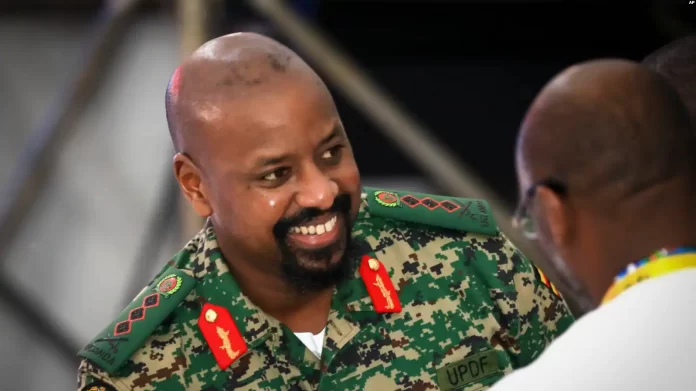Public celebrations honoring Uganda’s president’s son have raised fears that he is aiming for the presidency after years of being groomed to succeed his father, President Yoweri Museveni, who has been in power since 1986.
In recent days, three ceremonies commemorating Lt. Gen. Muhoozi Kainerugaba’s 48th birthday have been held in Kampala, the capital, and his followers in other regions of this East African country have staged exciting marches in his honor.
Hundreds of people, including top government officials and military leaders, attended Saturday’s thanksgiving ceremony.
Kainerugaba, Uganda’s infantry commander, has become more assertive in his Twitter tweets, expressing his desire to dominate the country. He mentioned expanding sports.
budget in favor of young people when he “wins power in this country.” And he says he will announce his political program soon.
“The fact that all those who used to abuse me on a daily basis are now being forced to swallow their words by the people is great,” he said on May 2, referring to recent rallies where throngs of people wore T-shirts bearing his image.
Kainerugaba’s supporters say he offers Uganda the opportunity of a peaceful transfer of power in a country that has not had one since independence from British colonial rule in 1962. But opposition leaders, critics and others eager for change say his rise is leading the East African country toward hereditary rule.
Kainerugaba’s birthday celebrations should be seen as a formal introduction of “the crown prince and heir to the Ugandan throne,” critic Muniini K. Mulera wrote in a column in the local Daily Monitor newspaper. Museveni “has entered his last lap of a long walk towards the realization of a fifty-year-old dream to create dynastic rule,” he wrote.
Kainerugaba is also under investigation. Some argue that Kainerugaba has already crossed the line because Ugandan law prevents a serving military commander from participating in partisan politics. Other army officers who discussed politics were humiliated, they said.
Last Monday, a Ugandan lawyer filed a petition with the Constitutional Court, requesting that Kainerugaba’s political actions be declared illegal. The petition also asks for Kainerugaba to be charged with treason, claiming that his actions are destabilizing.
Kainerugaba joined the army in the late 1990s, and his climb to the top of the armed forces has been controversial, with critics labeling his rise to the presidency the “Muhoozi Project.”
Museveni and Kainerugaba himself have denied the existence of such a scheme, but it appears a transition is now underway as Museveni, 77, serves what could be his last term without a recognizable successor within his government.
Museveni has not said when he would retire. He has no rivals within the ruling National Resistance Movement party, the reason many believe the military will have a say in choosing his successor.
Most of the heroes of the jungle war that ended years-long civil strife and launched Museveni’s presidency have since died or been retired from the army, putting authority in the hands of young military officers who see Kainerugaba as their leader.
Kainerugaba, the pillar of his father’s personal security apparatus, is now the de facto head of the military, with his allies strategically deployed in command positions across the security services, according to observers.
Kainerugaba’s associates describe him as a dedicated military officer who often eschews ostentatious displays of power and wealth. He attended military schools in the U.S. and Britain before taking charge of a presidential guard unit that has since been expanded into an elite group of special forces.
A taciturn man, Kainerugaba lacks the public charisma and folksy style of Museveni, who has kept power in part by striking deals with his political rivals and even convincing some to serve in his government.
Museveni, a U.S. ally on regional security, is often credited with restoring Uganda to relative peace and security. But in recent years he has faced growing criticism over rights abuses against opposition supporters.
Bobi Wine, the popular singer who challenged Museveni in elections last year, accuses Kainerugaba’s security agents of torture. Wine, whose real name is Kyagulanyi Ssentamu, has repeatedly urged the U.S. to cut support for Uganda’s military.
Some analysts say that Museveni is unlikely to retire at all but could use his remaining years to pave the way for Kainerugaba to succeed him.
Uganda’s next presidential elections are due in 2026.
Although a Kainerugaba presidency is not inevitable, he could build “a critical mass of support” among soldiers and businesspeople to eventually take power, said Nicholas Sengoba, a political analyst based in Kampala. Kainerugaba’s public events, he said, are aimed at “testing the waters” as Museveni gauges public support for family rule.
“The son helps the father to consolidate,” he said. “The father helps the son now because he’s in charge.”

